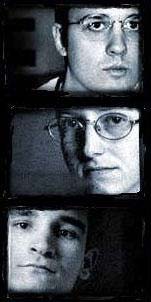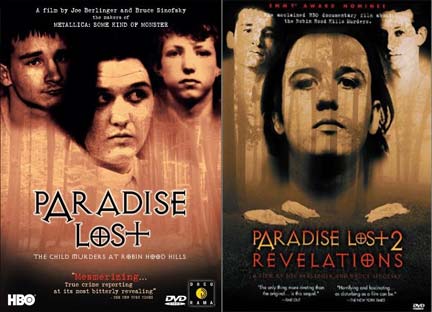|
Issue #12 July 7th - July 20th, 2006
West Memphis Three
Now imagine being prosecuted and convicted of a crime based almost solely on what someone might find in that room. I’ll bet that it’s not picture perfect, because no teen is perfect. And if you’re anything like I was, I’ll double that wager to say that they might have made more than one wrong assumption about the kind of person you’d turn out to be. In 1993 in West Memphis, Arkansas, this very thing happened to three teenage boys who were branded satanic killers because they enjoyed heavy metal music, wore black, and read books by Dean Koontz and Stephen King. And in a very real sense, it is still happening to them. First, let’s go back to the beginning. In the small, rural town of West Memphis, three brutally murdered and mutilated boys (Christopher Byers, Steve Branch, and Michael Moore) were found in the woods outside of town on the afternoon of May 6th, 1993. There was no blood around the bodies, as well as no bug bites on the boys’ skin, indicating that they had been moved to this location after their deaths had already occurred. Fueled by the community’s panic that this crime must have been committed by a satanic cult, the local police immediately focused on three teenage boys known to wear black and listen to Metallica; Damien Echols, Jason Baldwin, and Jessie Misskelley. In a move that still fuels many of the appeals for the three teenager’s convictions, the police held the seventeen year old, mentally challenged, Misskelley for twelve straight hours without his parents or a lawyer present. The result of this intense interrogation was a confession rife with obvious mistakes and leading questions, only forty-five minutes of the incriminating tapes were ever aired. However, if this information had led the police to more clues with which they might tie the crime together it might be something, but it didn’t. None of the young men accused of the crime had access to a vehicle to move the bodies, nor was any other blood evidence ever linked to them. Considering the amount of brutally inflicted wounds that were present on the bodies, this in itself is somewhat of a miracle. No, they never found any solid forensic evidence linking these three teens to the crime. All they did have were some fibers that were microscopically similar to those found at the crime scene. Microscopically similar, like two cotton fibers or two brunette hairs might be, but not conclusively the same, mind you. And for this, Misskelley and Baldwin are in jail for life, and Echols will eventually be put to death by the state of Arkansas. On the night of the boys’ disappearances, May 5th, an unknown young man that was covered in blood wondered into a local restaurant. The man appeared to be mentally disturbed and disorientated. After he left, the manager contacted the police who came out and took blood scrapings and other evidence from the bathroom. That evidence was later misplaced and the possibility for doing a blood comparison on what they had found was gone forever. There was another suspect, the stepfather of Christopher Byers, John Mark Byers. John Byers had a past history of domestic abuse and drug abuse charges that were never followed up on by the police before 1993. Since the boys’ murders, he was investigated for theft and his wife, Christopher’s mother, died under very mysterious circumstances. Surprisingly, John Byers was not originally on the police’s radar, but during the filming of the HBO documentary, Paradise Lost, he gave a knife to the filmmakers that was later shown to have blood on it that matched Christopher’s blood. Even after that evidence was turned over to the West Memphis police department, they still chose to focus on their teenage suspects. Unfortunately for the case, Byers has since passed away. However, before his death he lived an almost pressure free existence, even coming to Oklahoma to record a gospel album and allowing himself to once again be the centerpiece for another HBO documentary, Paradise Lost 2: Revelations, in 2000. It was as though he couldn’t get enough attention from these unfortunate deaths. Now, mostly because of the two films, there is a widespread and public outcry to get to the bottom of these murders. This is apparently something of an uphill battle, as a lot of the evidence was not properly catalogued by the West Memphis police department, and almost any conviction is extremely difficult to overturn because our legal system does not like to admit that it can occasionally make mistakes. It is also an extremely hard task to admit to the victim’s families that not only have their children’s real killers walked free for over ten years, but that they supported the wrongful imprisonment of others. My reaction to this case is the exact opposite of the repression and denial that the system often prefers. If we are expected to stand behind our justice system, then we need to admit when it makes errors. We also need to confront that part of our human nature that lashes out at those different than us, those outsiders that often bear the brunt of society’s internal struggles. The case that has become known as the West Memphis Three should not become another blemish on a system that already boasts of the Salem witch trials, slave trade, and the still unresolved 1964 Mississippi murders of three civil rights workers.
It is in this spirit of moving forward that I urge all of you to learn more about this case by visiting www.wm3.org. The case evidence and complete back-story can be found there for anyone who is interested to go through and make their own decisions. There are also several books that break down the case on a point-by-point basis and the previously mentioned films, Paradise Lost and Paradise Lost 2, that present all of the information in the most straightforward way possible. Or, if you live in Oklahoma and you wish to become involved in some way, please contact jennickell@aol.com. Remember, nothing ever changes or moves forward as long as the people remain as inactive as the system. |
||
©2006 NONCO Media, L.L.C.

 I want each of you to close your eyes and imagine what your bedroom looked like as a teenager. Where there posters on the walls? Where their albums haphazardly stacked up next to your CD player? What books lined your shelves?
I want each of you to close your eyes and imagine what your bedroom looked like as a teenager. Where there posters on the walls? Where their albums haphazardly stacked up next to your CD player? What books lined your shelves? A sad note to everything is that when I first learned of this case during my senior year, I tried to persuade others at my school to do something proactive in response to this miscarriage of justice. However, I came from a small town and the “satanic panic” was in full effect there. Most of the kids I talked to honestly believed that these outsiders could very well have been capable of these crimes. After that experience, I believed there was nothing a single person like myself could have done, but now I know better. We should be able to live in a society that doesn’t base judgments solely on these misleading factors, and large changes can begin in even the humblest foundations.
A sad note to everything is that when I first learned of this case during my senior year, I tried to persuade others at my school to do something proactive in response to this miscarriage of justice. However, I came from a small town and the “satanic panic” was in full effect there. Most of the kids I talked to honestly believed that these outsiders could very well have been capable of these crimes. After that experience, I believed there was nothing a single person like myself could have done, but now I know better. We should be able to live in a society that doesn’t base judgments solely on these misleading factors, and large changes can begin in even the humblest foundations.